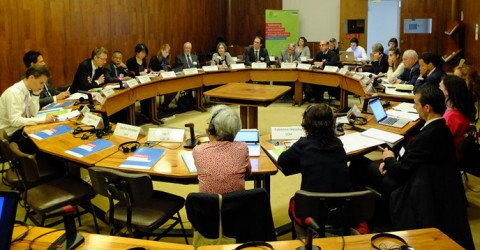
GCED Basic Search Form
Quick Search
当前位置
新闻

On 28 May 2019, UNESCO and the UN Special Rapporteur on freedom of religion or belief Ahmed Shaheed hosted a one-day expert consultation meeting on antisemitism at UNESCO Headquarters in Paris. The meeting was part of a series of international consultation meetings organized by the UN Special Rapporteur in view of his report to the UN General Assembly later this year. For the first time the UN Special Rapporteur will report on antisemitism in accordance with his mandate to identify existing and emerging obstacles to the enjoyment of the right to freedom of religion or belief.
During the introduction, UN Special Rapporteur Ahmed Shaheed stated that “all indicators show a global surge in hatred. Antisemitism is the oldest and possibly the most widespread form of hate, and it is also often the first to raise its ugly head as societies descend into bigotry. Just as one form of hate provides a foundation for all forms of hatred, addressing antisemitism will provide a foundation to deal with all forms of hatred. I am holding these consultations because I want to hear first-hand from the affected communities and from those working to address this global challenge.”
The consultation meeting was hosted by UNESCO’s Education Sector in line with its commitment to address antisemitism and all forms of discrimination through education. In this context, Stefania Giannini, UNESCO Assistant Director General for Education, welcomes the focus of this year’s report of the UN Special Rapporteur, underlining the power of education to prevent all forms of discrimination: “Like any form of discrimination, antisemitism poses a threat to the realization of all peoples’ human rights. As we are witnessing a global rise of antisemitism, we cannot stand by, but have to address it. UNESCO is committed to promote education as a tool to build the resilience of learners to anti-Semitic stereotypes, to raise awareness for the harmful effects of discriminatory rhetoric and to empower them to reject all forms of prejudice.”
The consultation meeting at UNESCO convened 25 experts on antisemitism, representing the main Jewish-related organizations, human rights organizations, national agencies in charge of intolerance and non-discriminations and academic research centers from France, Belgium, Italy, Spain and Israel. During the meeting, participants discussed contemporary trends of antisemitism in Europe, the impact of antisemitism on the rights of Jews and the freedom of religion or belief as well as responses and preventive measures to address antisemitism. Participating institutions included the Council of French Jewish Institutions (CRIF), the American Jewish Committee (AJC), the International League against Racism and Antisemitism (LICRA), Ligue des droits de l’Homme (LDH), Inter-ministerial delegation on the fight against racism, antisemitism, and anti-LGBT hate (DILCRA), the Coordination Committee of Jewish Organizations in Belgium (CCOJB), the Union of Jewish Students in France (UEJF), Yad Vashem, Mouvement contre le Racisme, l’Antisémitisme et la Xénophobie (MRAX), UNIA, the World Jewish Congress, Centro Sefarad-Israel, the Union of Italian Jewish Communities, Site Mémorial du Camp des Milles, the Antisemitism Study Group of the French National Assembly, the Mémorial de la Shoah, and B’nai B’rith International.
UNESCO is committed to addressing and preventing cotemporary antisemitism through its programs in support of Global Citizenship Education (GCED) and the prevention of violent extremism through education (PVE-E). In this context, UNESCO promotes education systems that address antisemitism in and through education and build the resilience of young people to extremist ideologies and prejudice. In support of this goal, UNESCO builds the capacities of education policymakers and teachers though guidelines, targeted trainings and the development of educational materials, including guidelines for policymakers on “Addressing antisemitism through education”, published jointly with OSCE/ODIHR in 2018.
URL:
